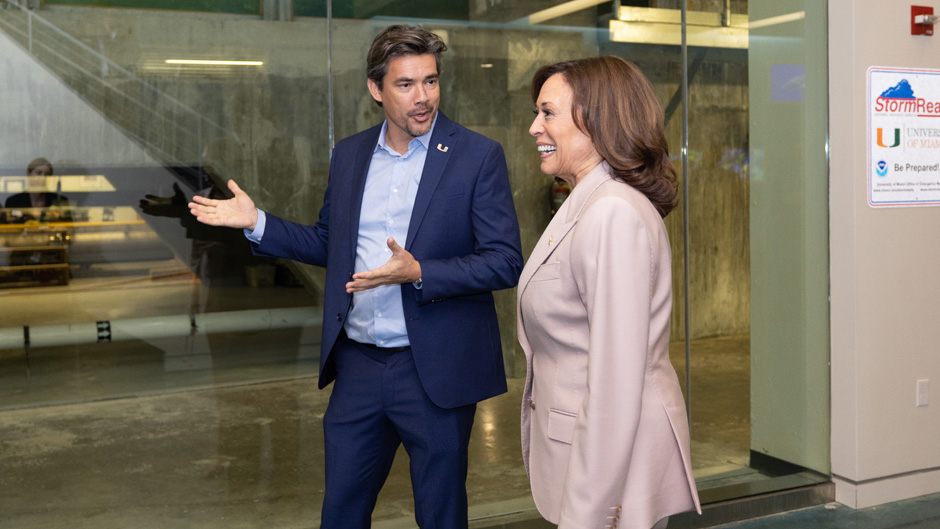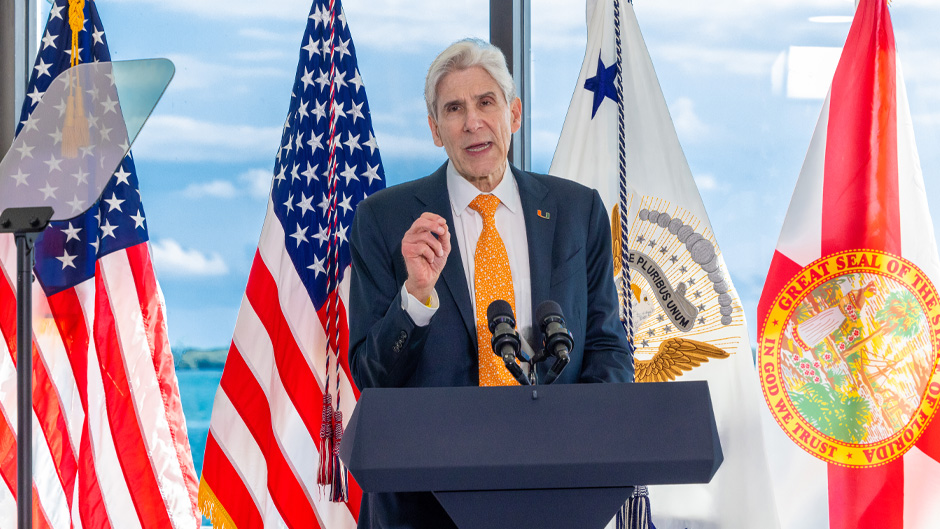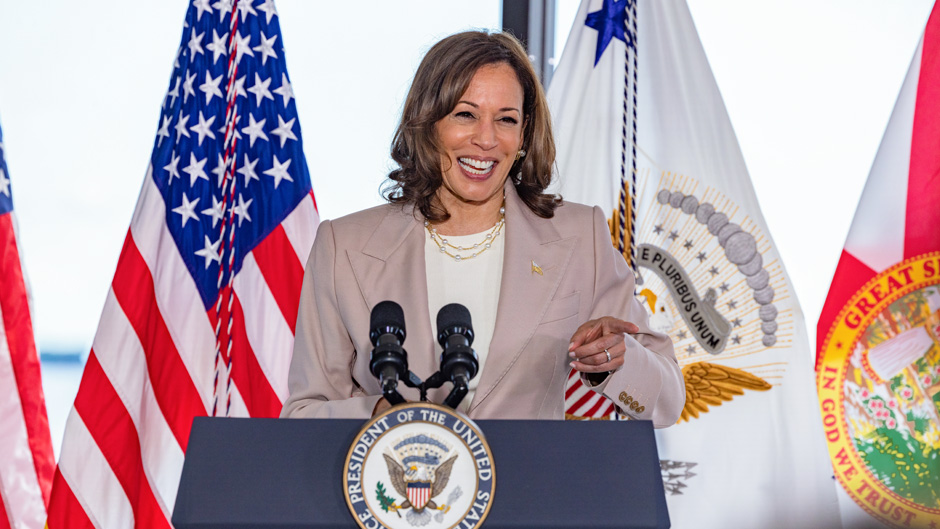It was just a pat on the back.
But that gesture from the first female second in command of the United States was a jolt of confidence that helped propel graduate student Aliyah True toward the dais, where she introduced Vice President Kamala Harris to dozens of local, state, and national dignitaries, who were gathered on Friday at the University of Miami Rosenstiel School of Marine, Atmospheric, and Earth Science.
A second-year doctoral student at the Rosenstiel School, True was chosen to introduce Harris during the vice president’s first visit to the University. She said the experience was surreal but wonderful.
“It hasn’t really sunk in yet,” said True, a first-generation student, studying coral physiology and immunity. “I don’t really get starstruck, but I’m honored to have been the one to introduce her.”
On the eve of Earth Day, Harris stopped at the Rosenstiel School for about two hours on Friday to learn about some of the cutting-edge climate research happening at the institution. She chatted with Andrew Baker, a professor of marine biology and ecology, who is leading a massive hybrid coral reef coastline protection project and got a chance to see and hear from graduate students Samantha Medina and Will Downs about the Alfred C. Glassell Jr. SUSTAIN Laboratory, a wind-wave tank that can simulate Category 5 hurricane conditions.

“The work that’s happening here is a model—not only for our country but around the globe,” Harris said to a crowd of students, faculty members, University trustees, and government leaders. “I want to thank the University for hosting us today and the students for inspiring us. I am counting on your leadership. And I’m counting on you, Aliyah.”
Harris went on to announce a new Climate-Ready Coasts initiative to devote $562 million to help 149 coastal communities across the United States start climate resilience projects. With 40 percent of Americans living along a U.S. coast, Harris said she and President Joe Biden realize the critical need to protect these cities, towns, and counties.
“To live in a coastal community is to live on the front lines of the climate crisis,” she said.
With Florida getting $78.7 million, some of the nature-based solutions within its proposal include a mangrove restoration effort in North Miami, adding oyster reefs in the Gulf of Mexico to help cleanse the ocean from pollutants, and planting lab-grown corals in the Florida Keys.
“All of this makes sense, it works, and it is very doable,” Harris said. “Through these investments, we will help safeguard Florida’s natural beauty—its oceans, beaches, and coral reefs. And all of this, so that Miami remains a must-see destination for tourists worldwide.”
Also speaking before Harris were University President Julio Frenk, Miami-Dade County Mayor Daniella Levine Cava, Fort Lauderdale Mayor Dean Trantalis, and National Oceanic and Atmospheric Administration (NOAA) administrator Richard Spinrad, who all thanked the Biden administration for their support.

“Miami is ground zero for climate change,” Frenk said. “Because of that, we have made research and the delivery of solutions to climate change a top priority in the University’s strategic plan.”
But while research is always ongoing, researchers and scientists at the Rosenstiel School and at the entire University have been working to forge strong partnerships with government. Last summer, a team of faculty members led by Baker and Brian Haus, a professor of ocean sciences, earned a $7.5 million grant through the Defense Advanced Research Projects Agency, part of the Department of Defense, to explore using hybrid reef structures to protect military bases and coastlines. In addition, the Cooperative Institute for Marine and Atmospheric Studies—based at the Rosenstiel School—helps unite the research of 10 partner universities with NOAA to better understand the Earth’s oceans and atmosphere.
Baker said that he thoroughly enjoyed meeting the vice president and learning about her support for nature-based solutions to mitigate climate change.
“It was an honor to talk to Vice President Harris about the exciting new research to reduce climate impacts that we are doing at the Rosenstiel School,” Baker said. “For her to see our facilities firsthand, talk to graduate students involved in the research, and share the White House perspective with us, it felt like a truly pivotal moment.”
Rosenstiel School Dean Roni Avissar also recognized the significant moment for his school.
“Vice President Harris’ visit recognizes that we are at the forefront of this type of research and that we are using 21st century approaches to address the problems of threatened coastlines,” Avissar said.
Several other faculty members and students were glad they got the chance to attend the event. Remedy Rule, a master’s degree candidate in marine biology, said it was a once-in-a lifetime opportunity she did not want to pass up. Environmental policy doctoral students Jalyse Cuff and Gabriella Berman were eager to hear Harris talk about a field they both hope to join in the future.
“I’m interested in this opportunity to see her unveil new programs and funding that is badly needed for climate change work and to see the things we work for happening in real life,” Cuff said.

